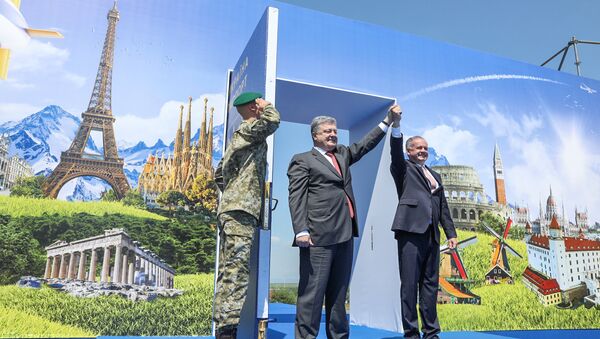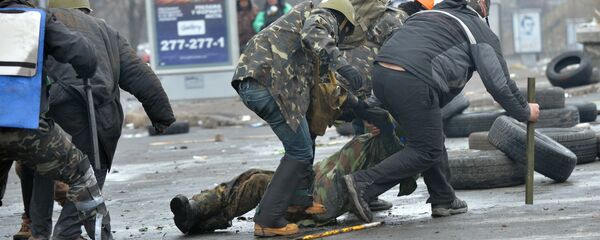In a mainstream media interview, Kestutis Lancinskas, a Lithuanian police chief, said there had been a sizeable spike in "all types of crime" in Ukraine in 2017, due to its ongoing political turmoil and economic crisis — corporate raiding, racketeering, prostitution, human trafficking, and theft are all on the march, producing a "very high crime rate."
Kestutis Lancinskas, @EUAM_Ukraine: We provide advice, but it's up to you to make reforms, because it is your country. pic.twitter.com/XMUO7sob4c
— EESRI.org (@EESRIorg) April 24, 2017
Much of the crime is facilitated by a burgeoning illicit firearms market, in itself driven by the huge flow of arms surging into the country in aid of the government's protracted war on the Donbass region.
GHQ of #Ukraine Army: in the period 2014-2016, 10324 firearms were lost or stolen. https://t.co/UKj19LlKA0
— Gracchus Babeuf (@GBabeuf) March 26, 2017
Nonetheless, Lancinskas was certain this huge uptick in illegal activity in the country doesn't pose a danger to EU member states, despite the bloc's June activation of a visa-free regime with Kiev, allowing Ukrainian citizens to travel to Schengen Area countries without a visa for 90 days.
"Organized crime always had a lot of possibilities to get into European countries even when the visa regime was in place. These people find ways to get in. Even with the strongest controls, they find ways," he explained.
One year in office. Interview of #EUAM Head, Kestutis Lancinskas, on reforms, obstacles, achievements of the Mission and Ukrainian partners. https://t.co/zQPbc0jaEb
— EUAM Ukraine (@EUAM_Ukraine) February 6, 2017
Lancinskas' comments will likely offer little relief to EU citizens already troubled that the bloc's borders have been thrown open to a politically and economically unstable state currently in the grip of civil war, riddled with easily accessible firearms and plagued by high and rising crime levels. Moreover, many are sure to ask why it is, if Ukraine has a known history of exporting organized crime to the continent, the EU are so keen to welcome the country's residents.
Other sentiments expressed by Lancinskas imply EU leaders simply aren't taking the country's plethora of problems seriously.
His EU mission, comprised of 250 experts, is suggested to be somewhat impotent — unlike the EU's Kosovo mission, which has investigatory powers, the Kiev contingent merely offers advice to Ukraine on how to improve its state structures.
Lancinskas acknowledges Lutsenko appears more interested in settling old scores, catching and prosecuting members of the pre-coup government for alleged crimes, than stamping out corruption in his own ranks. Despite his focus, Lutsenko has yet to catch any "big fish" — and is destroying evidence on who was behind the sniper fire that killed dozens in the lead up to the Maidan coup in 2014, evidence that may well reveal the shooters were not government-backed, but soldiers of fortune from Georgia, the Baltic states and Poland.
Lutsenko has also dissolved his Reform Department, leaving the EU team in the dark as to who — if anyone — they are meant to meet and speak with in future.
In the same interview, an anonymous EU diplomat is furthermore quoted as saying the Security Service of Ukraine (SBU) is trying to clamp down "on civil society, particularly anti-corruption activists," and the country is "seriously [backtracking] from the reforms that civil society is demanding."
There is a risk, they said, of playing "the usual international game," whereby locals "pretend they do reforms to our liking" and the EU pretends "we don't see they don't do it."
Evidently, the EU's relentless push to absorb Ukraine into its political, social and economic folds may come back to haunt bloc leaders — but Ukraine's willingness to be absorbed may also be regretted by the country's leaders and population alike.
The experience of Moldova, Ukraine's southwestern neighbor, may be instructive in this regard.
The tiny country has enjoyed a similar visa-free travel regime with the EU since 2014, but it has not improved the country's political or socioeconomic situation in any perceptible way.
Instead, Moldova's economy remains largely dependent on remittances from citizens working abroad, with Moldovan workers in Russia alone accounting for nearly 20 percent of Moldova's GDP.




